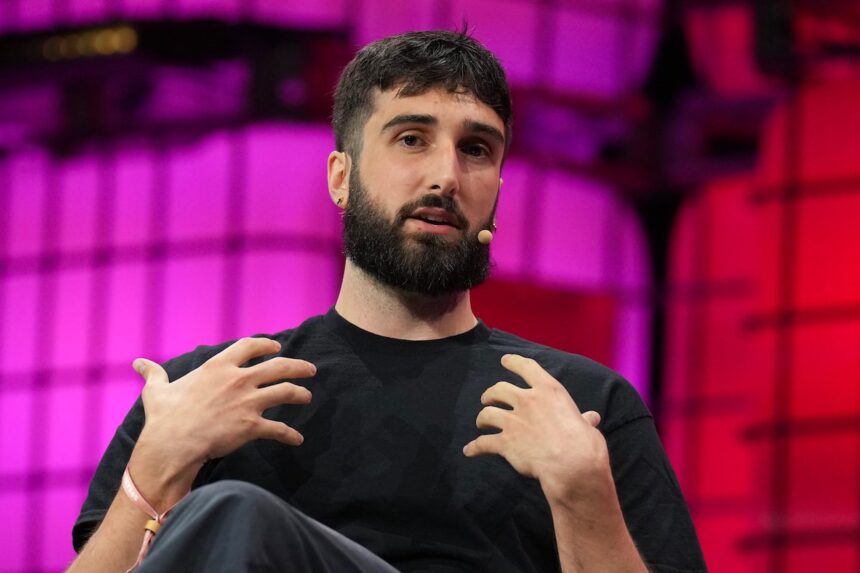Article – Canadian tech’s momentum feels like paddling against a relentless tide. Just when a promising startup reaches critical mass, the gravitational pull of Silicon Valley or the deep pockets of American tech giants inevitably yank them southward. This familiar cycle makes the recent stance from Cohere, one of Canada’s artificial intelligence darlings, all the more significant.
At a Toronto tech conference last week, Aidan Gomez, Cohere’s CEO and co-founder, delivered what amounted to a national challenge: Canadian startups should resist the temptation to flee south and instead build world-class technology companies at home.
“We believe in the Canadian ecosystem and its potential,” Gomez told the audience at Elevate Festival. “The talent is here, the research institutions are world-class, and the government support exists. What’s often missing is the conviction to stay and build.”
His comments came as Cohere itself demonstrates that Canadian AI companies can compete globally while maintaining their northern headquarters. The Toronto-based company, which develops large language models to rival those from OpenAI and Anthropic, recently secured $450 million in Series C funding, pushing its valuation beyond $2.2 billion.
But Gomez’s rallying cry isn’t mere patriotic sentiment. It addresses a fundamental challenge in Canadian tech: the “branch plant” syndrome where innovation starts in Canada but ultimately benefits foreign economies.
The numbers tell a sobering story. According to Statistics Canada, Canadian businesses spent just 0.8 percent of GDP on research and development in 2021, significantly below the OECD average of 1.7 percent. Meanwhile, a Council of Canadian Innovators report reveals that nearly 40 percent of Canadian tech startups that receive early funding end up relocating their headquarters to the United States before hitting scale.
Nick Frosst, another Cohere co-founder who previously worked at Google, pointed to a persistent confidence gap. “Canadian entrepreneurs often default to believing success requires Silicon Valley,” he noted. “But we’re proving that’s a dated perspective. The computational infrastructure, talent, and investment networks have become increasingly distributed.”
The case for staying put isn’t just emotional. Canada’s AI ecosystem offers tangible advantages, including government programs like the Strategic Innovation Fund and Scientific Research and Experimental Development tax incentives that significantly offset R&D costs. The country’s more balanced immigration policies also provide access to global talent pools that U.S. companies often struggle to tap.
Former BlackBerry co-CEO Jim Balsillie, a vocal advocate for Canadian tech sovereignty, endorsed Cohere’s position but added a caveat. “Building here requires more than just choosing a postal code,” he said in a phone interview. “It requires deliberate strategies to protect intellectual property and data resources that create lasting value within our borders.”
The Vector Institute, a Toronto-based AI research organization, reports that Canada produces the third-highest number of peer-reviewed AI research papers globally, behind only the U.S. and China. Yet commercializing this research domestically remains challenging.
Venture capitalist Janet Bannister of Real Ventures suggests the funding landscape is improving but still presents hurdles. “Five years ago, raising a Series B in Canada was nearly impossible,” she explained. “Today, we’re seeing more growth capital, but still not at the scale or velocity of the U.S. market.”
Gomez acknowledged these challenges but pointed to Cohere’s experience as evidence they can be overcome. The company maintains its headquarters in Toronto while operating offices in San Francisco and London, effectively creating a hybrid model that accesses global markets without surrendering its Canadian identity.
“We’ve built relationships with compute providers, secured multinational clients, and attracted world-class AI researchers—all while keeping our center of gravity in Canada,” Gomez said.
Other Canadian tech leaders have begun voicing similar sentiments. Shopify, arguably Canada’s greatest tech success story, has demonstrated that global reach doesn’t require a U.S. headquarters. Despite recent layoffs, the Ottawa-based e-commerce platform continues to exemplify how Canadian tech can achieve international scale.
Dax Dasilva, founder of Montreal-based Lightspeed Commerce, suggests Canadian companies bring unique perspectives to global markets. “There’s a thoughtfulness and inclusivity in Canadian business culture that creates more sustainable companies,” he noted at the same conference. “That’s becoming increasingly valuable in technology development, especially in AI where ethical considerations matter tremendously.”
The federal government has taken notice of this push to strengthen Canada’s innovation economy. Industry Minister François-Philippe Champagne recently announced plans to review the Investment Canada Act, potentially giving authorities more power to prevent the acquisition of promising Canadian startups by foreign entities when such deals might harm national economic interests.
For early-stage founders weighing their options, Cohere’s example offers a potential roadmap. The company has secured partnerships with Google Cloud and Oracle, proving Canadian headquarters doesn’t limit access to critical infrastructure or enterprise customers.
“The narrative that you must relocate to succeed is outdated,” said Raquel Urtasun, founder of self-driving technology company Waabi and former chief scientist at Uber ATG. “Today’s technologies enable distributed teams, and investors increasingly recognize that innovation isn’t geographically constrained.”
As artificial intelligence continues reshaping global economies, Canada’s pioneering role in developing the technology—through researchers like Yoshua Bengio, Geoffrey Hinton, and their numerous students—positions the country uniquely. The question now is whether the next generation of AI companies will convert this academic advantage into commercial dominance without surrendering economic benefits to other jurisdictions.
“This isn’t just about flag-waving,” Gomez emphasized. “It’s about building an innovation ecosystem with sufficient gravity to sustain itself—where talent, capital, and ideas circulate rather than drain away.”
For a country that has often watched its brightest innovations migrate south, Cohere’s stance represents both a challenge and an opportunity to rewrite a persistent national narrative—proving that in the AI era, Canadian startups can indeed stay home and still conquer the world.






